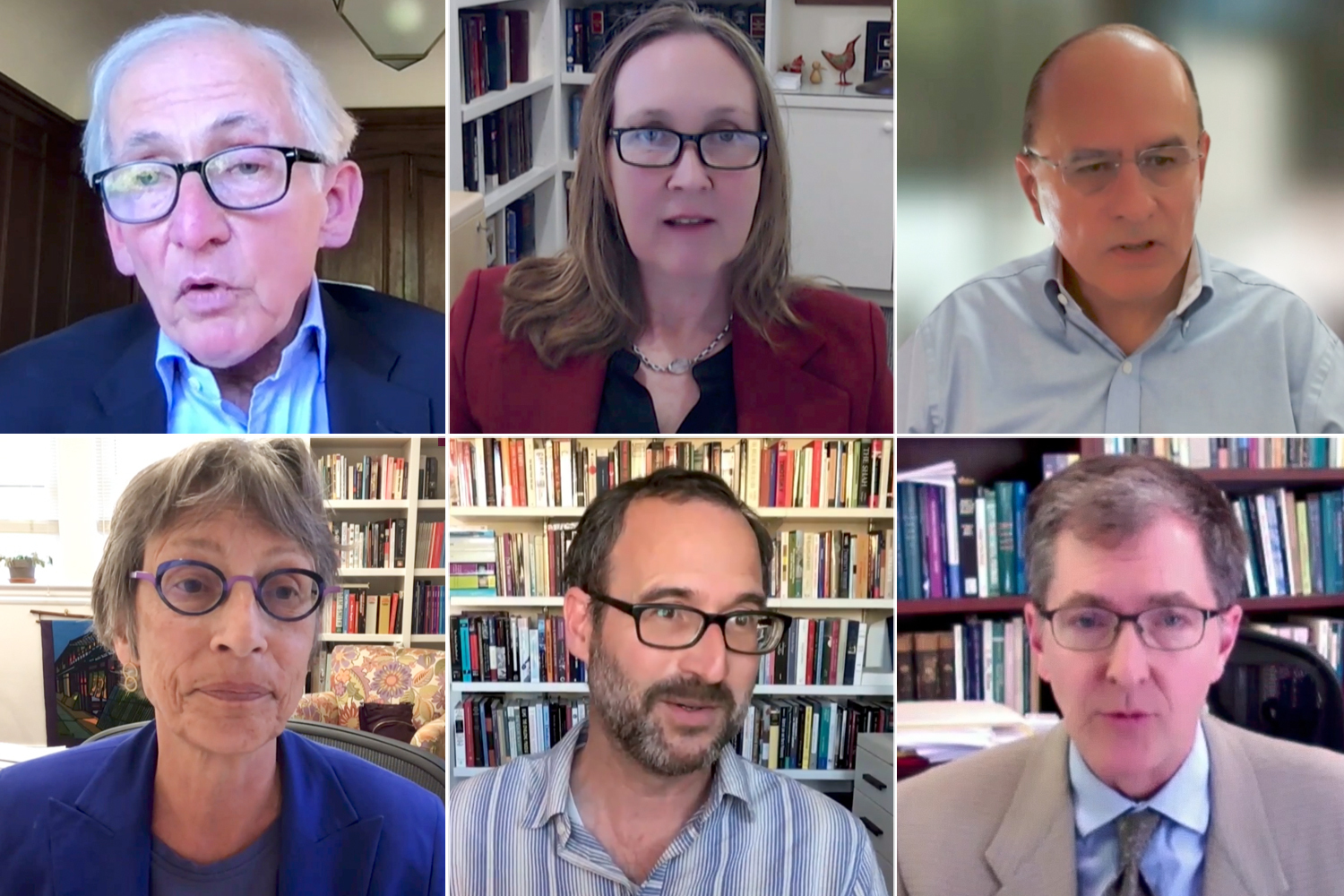
The 2023-24 Annual Meeting of the Academic Council featured insights from university leaders on enhancing dialogue skills among students. | Andrew Brodhead
During the 2023-24 Annual Meeting of the Academic Council, Stanford Provost Jenny Martinez highlighted the importance, and difficulty, of fostering an environment conducive to the open and respectful debate of diverse ideas.
“The goal of civil discourse isn’t enforced agreement or consensus, but understanding and genuine engagement with one another in a pluralistic society,” Martinez said. “We hope to support our students in building the skills of engaging across difference that are fundamental tools to their learning here at Stanford and to their participation in civic life.”
Martinez moderated a panel discussion on “Building the Capacity for Civil Discourse in Our Universities and Our Society,” featuring insights from university leaders on enhancing dialogue skills among students. The meeting, conducted virtually this year, also included remarks from the president and the chair of the Faculty Senate.
Despite encouraging survey data about students’ willingness to engage in difficult conversations with each other, they remain uneasy about discussing controversial topics, with fears of online backlash, said Lanier Anderson, vice provost for undergraduate education, the J.E. Wallace Sterling Professor in the Humanities, and a professor of philosophy.
Students must come to the university with “serious open-mindedness,” Anderson said, and build subsidiary skills such as active listening, mindfulness, self-understanding, and emotional regulation that will help them contribute to fruitful discourse.
The university is supporting students’ development of these skills through several initiatives, such as summer dialogue groups with the McCoy Family Center for Ethics in Society, the Civic, Liberal and Global Education (COLLEGE) program, activities during New Student Orientation, and substantive training for residential fellows and residential advisors.
Data collected from participants in the COLLEGE sequence shows what is working and not working, providing “almost a little laboratory for what we’re trying to do,” said Dan Edelstein, the William H. Bonsall Professor in French. For example, feedback suggests that delivery can sometimes be more important than content in affecting how people respond to controversial speech.
Edelstein said instructors must discuss the underlying reasons for free speech and pluralism with students. “Because this generation has grown up in such a hyperpolarized environment, it’s no longer self-evident to them that there is a lot to be learned from people you disagree with.”
C. Matthew Snipp, interim vice provost for student affairs, underscored the importance of the residential experience in cultivating civic discourse skills. Toward that end, the Office of the Vice Provost for Undergraduate Education (VPUE) is developing programs for student leaders in the dorms to help foster dialogue.
“It’s really time for us to look carefully at that experience and try to reinvigorate the intellectual life that we find in the dorms,” said Snipp, who is also the vice provost for faculty development, diversity and engagement, and the Burnet C. and Mildred Finley Wohlford Professor in the School of Humanities and Sciences.
Snipp also shared the ground rules he sets to encourage robust discussion in his course on race and ethnicity in the U.S. These include asking students to be mindful of nonverbal cues such as their body language and facial expressions, mandating participation, and announcing early on that the course will confront uncomfortable truths about American society.
“Trying to avoid the ugliness and the terribleness of some of these things is a little like trying to teach students in a medical school to become doctors without ever letting them see a sick person,” Snipp said. “That knowledge and that experience is something that gives them power rather than weakens them.”
Debra Satz, the Vernon R. and Lysbeth Warren Anderson Dean of the School of Humanities and Sciences, expressed concern that no institution is doing a good job of modeling civil discourse and engagement at this time.
“People are more motivated to manipulate facts, the loudest voices get heard the most, and there’s a lot of demonizing of the opposition,” said Satz, who is also the Marta Sutton Weeks Professor of Ethics in Society.
She emphasized the need for citizens who are open-minded, humble, and willing to admit their lack of knowledge and learn from others.
Satz highlighted a spring quarter class she is co-teaching, Democracy and Disagreement, which showcases experts who hold opposing viewpoints and model civil dialogue on contentious issues such as Israel/Palestine, gun regulation, and institutional neutrality. “It’s really important to know that most of our students, most of the community, really relishes the ability to learn and listen,” Satz said.
Encouraging discussion
During the Q&A session, Snipp addressed the complexities of classroom power dynamics and the effect they can have on student discussions.
“I’m sure many of you have seen this, where you see a pecking order that will develop in a classroom,” he said.
Snipp said it is important for instructors to be proactive in recognizing and correcting these power imbalances. He suggested interventions such as publicly acknowledging the contributions of students who are less frequently heard by saying, “Thank you, that was very insightful. I really appreciate that thought.”
Someone asked about whether there’s any effort to signal the importance of civil discourse during the admissions process. Edelstein said a new question on the Law School’s application probing how applicants responded to ideas they found disagreeable elicited revealing answers. “We’re hoping that we could get some similar results with 17-year-olds, versus 20- to 23-year-olds,” he said.
Panelists also discussed how optimistic they were about their ability to make a difference despite challenging times. They noted that the growing awareness among students of a need for better engagement tools represents an opportunity.
“The fact that they feel the need for that is our opening to make these programs be successful,” Anderson said.
Addressing challenges
During President Richard Saller’s annual report to the Academic Council, he discussed the past “tumultuous” year, which included the ongoing Israel-Hamas war in the Middle East and the dissolution of the 109-year-old Pac-12 conference.
Saller said that following the Hamas terrorist attack on Oct. 7, he and Martinez prioritized the safety of the campus community while preserving space for the expression of First Amendment-protected free speech. “It was not to announce our personal judgments or claim to speak for the institution, since members of our community hold different and sometimes sharply conflicting views,” he said. “Preservation of the safety of the campus required that we be sensitive to the changing context both locally and nationally.”
Efforts by multiple departments to increase security, monitor developments, and regularly discuss strategy have been integral to avoiding violence and minimizing disruptions. Saller also acknowledged the need for ongoing efforts to combat antisemitism and Islamophobia. “I am grateful to the two committees who are gathering information and providing recommendations to improve the campus climate,” he said.
Saller said the university’s transition to the Atlantic Coast Conference (ACC) following the dissolution of the Pac-12 was necessary for Stanford athletes to compete at the highest level. He highlighted a task force focused on minimizing the academic impact of increased travel for athletes and navigating the many significant changes affecting college sports, particularly concerning athlete compensation and Title IX obligations.
Saller also showcased notable academic and research achievements, including advances in treating depression; expanding the potential habitats for life in the universe; and using technology to reduce social inequity.
Despite challenges, Saller noted that Stanford emerged stronger from challenges during the Vietnam War era, “rising from a good regional university to become a world-leading university.”
A busy year
Faculty Senate Chair Mary Beth Mudgett provided the annual report of the Senate of the Academic Council and praised the senate’s “tradition of rigorous questioning of leadership” and the administration’s responsive engagement.
Significant updates heard by the senate this year involved the launch of the Curriculum Transformation Institute from the Center on Teaching and Learning, which allows faculty teams to reimagine their introductory curriculum to better support students; the evolution of the Stanford neighborhood residential system; new educational programming in the residences through the Academic Residential Co-Curriculum; and insights from the Associated Students of Stanford University about students’ views on life in the neighborhoods. Senators also learned more about how the arts play a vibrant multidisciplinary role on campus.
Mudgett said the senate managed a heavy agenda this year, and its Steering Committee worked to ensure timely consideration of important topics, such as adjustments in academic planning following Stanford Athletics’ move to the ACC; undergraduate admissions in light of the Supreme Court ruling on affirmative action; and a petition to rescind a 2020 senate resolution on Scott Atlas, which Mudgett described as the year’s “most complex discussion.”
As the academic year concludes, the senate is set to review updates on university finance, university speech policies, and undergraduate admissions.
For more information
Mudgett is also the senior associate dean for the natural sciences in the School of Humanities and Sciences and the Susan B. Ford Professor of Biology.
